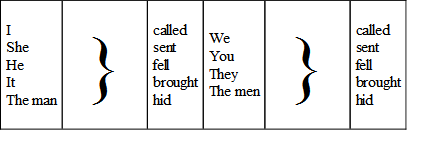PAST TIME
109. To express past time we change the form of the verb. Notice the following:

Notice that these various forms of the verb which express past time are all made by changes from the simple form, which expresses present time. You will also notice that these five verbs used in the above table all form their past time form in different ways. For example, call adds ed; send changes the final letter from d to t; fall changes the vowel in the middle of the word from a to e; bring changes both the vowel and the final letter from bring to brought; hide drops the final letter e.
110. Verbs whose past time forms are made by adding d or ed to the simple form are called regular verbs.
Verbs whose past time forms are made in some other way than by adding d or ed are called irregular verbs.
111. There are about two hundred of these irregular verbs which form their past time in the following ways:
1. By change in the vowel letter, as fall, fell; write, wrote; see, saw; sing, sang; come, came.
2. By dropping the final vowel; as hide, hid; slide, slid; bite, bit.
3. By dropping a vowel from the middle of the word; as bleed, bled; feed, fed; lead, led.
4. By changing the final letter or letters; as send, sent; lose, lost; spend, spent.
5. By changing the vowel and final letters; as bring, brought; seek, sought; catch, caught.
6. By changing the vowel sound and adding t or d; as sleep, slept; feel, felt; flee, fled.
There are some irregular forms which we must learn and be exceedingly careful in their use. Study the list in this lesson.
Более 800 000 книг и аудиокниг! 📚
Получи 2 месяца Литрес Подписки в подарок и наслаждайся неограниченным чтением
ПОЛУЧИТЬ ПОДАРОКДанный текст является ознакомительным фрагментом.